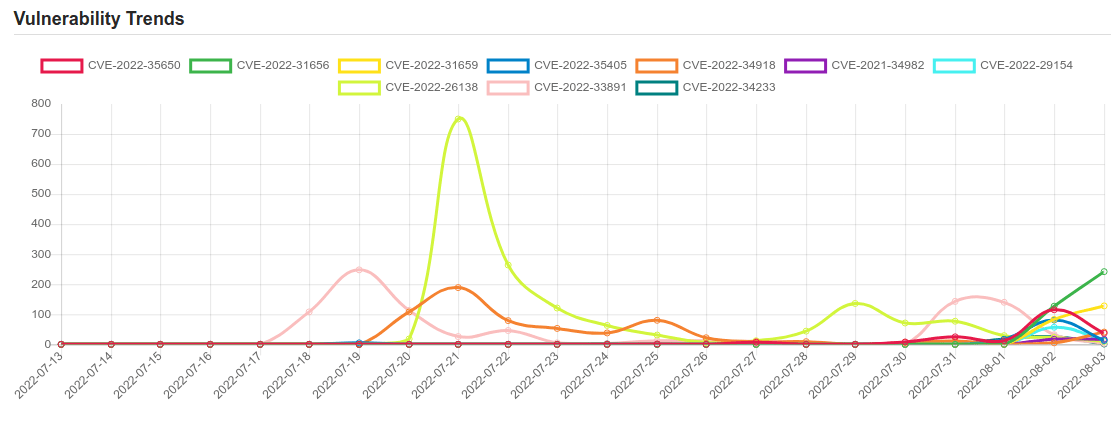Daily Vulnerability Trends: Fri Aug 05 2022

| CVE NAME | CVE Description |
| CVE-2022-33891 | The Apache Spark UI offers the possibility to enable ACLs via the configuration option spark.acls.enable. With an authentication filter, this checks whether a user has access permissions to view or modify the application. If ACLs are enabled, a code path in HttpSecurityFilter can allow someone to perform impersonation by providing an arbitrary user name. A malicious user might then be able to reach a permission check function that will ultimately build a Unix shell command based on their input, and execute it. This will result in arbitrary shell command execution as the user Spark is currently running as. This affects Apache Spark versions 3.0.3 and earlier, versions 3.1.1 to 3.1.2, and versions 3.2.0 to 3.2.1. |
| CVE-2022-34233 | Adobe Acrobat Reader versions 22.001.20142 (and earlier), 20.005.30334 (and earlier) and 17.012.30229 (and earlier) are affected by a Use After Free vulnerability that could lead to disclosure of sensitive memory. An attacker could leverage this vulnerability to bypass mitigations such as ASLR. Exploitation of this issue requires user interaction in that a victim must open a malicious file. |
| CVE-2020-14321 | No description provided |
| CVE-2022-32189 | No description provided |
| CVE-2022-30563 | When an attacker uses a man-in-the-middle attack to sniff the request packets with success logging in through ONVIF, he can log in to the device by replaying the user’s login packet. |
| CVE-2022-31181 | PrestaShop is an Open Source e-commerce platform. In versions from 1.6.0.10 and before 1.7.8.7 PrestaShop is subject to an SQL injection vulnerability which can be chained to call PHP’s Eval function on attacker input. The problem is fixed in version 1.7.8.7. Users are advised to upgrade. Users unable to upgrade may delete the MySQL Smarty cache feature. |
| CVE-2022-21877 | Storage Spaces Controller Information Disclosure Vulnerability. |
| CVE-2022-32832 | No description provided |
| CVE-2022-2622 | No description provided |
| CVE-2022-2509 | A vulnerability found in gnutls. This security flaw happens because of a double free error occurs during verification of pkcs7 signatures in gnutls_pkcs7_verify function. |
| CVE-2022-33318 | Deserialization of Untrusted Data vulnerability in ICONICS GENESIS64 versions 10.97.1 and prior and Mitsubishi Electric MC Works64 versions 4.04E (10.95.210.01) and prior allows a remote unauthenticated attacker to execute an arbitrary malicious code by sending specially crafted packets to the GENESIS64 server. |
| CVE-2022-30190 | Microsoft Windows Support Diagnostic Tool (MSDT) Remote Code Execution Vulnerability. |
| CVE-2022-35650 | The vulnerability was found in Moodle, occurs due to input validation error when importing lesson questions. This insufficient path checks results in arbitrary file read risk. This vulnerability allows a remote attacker to perform directory traversal attacks. The capability to access this feature is only available to teachers, managers and admins by default. |
| CVE-2022-35405 | Zoho ManageEngine Password Manager Pro before 12101 and PAM360 before 5510 are vulnerable to unauthenticated remote code execution. (This also affects ManageEngine Access Manager Plus before 4303 with authentication.) |
| CVE-2022-34918 | An issue was discovered in the Linux kernel through 5.18.9. A type confusion bug in nft_set_elem_init (leading to a buffer overflow) could be used by a local attacker to escalate privileges, a different vulnerability than CVE-2022-32250. (The attacker can obtain root access, but must start with an unprivileged user namespace to obtain CAP_NET_ADMIN access.) This can be fixed in nft_setelem_parse_data in net/netfilter/nf_tables_api.c. |
| CVE-2021-34982 | No description provided |
| CVE-2022-29154 | An issue was discovered in rsync before 3.2.5 that allows malicious remote servers to write arbitrary files inside the directories of connecting peers. The server chooses which files/directories are sent to the client. However, the rsync client performs insufficient validation of file names. A malicious rsync server (or Man-in-The-Middle attacker) can overwrite arbitrary files in the rsync client target directory and subdirectories (for example, overwrite the .ssh/authorized_keys file). |
| CVE-2022-26138 | The Atlassian Questions For Confluence app for Confluence Server and Data Center creates a Confluence user account in the confluence-users group with the username disabledsystemuser and a hardcoded password. A remote, unauthenticated attacker with knowledge of the hardcoded password could exploit this to log into Confluence and access all content accessible to users in the confluence-users group. This user account is created when installing versions 2.7.34, 2.7.35, and 3.0.2 of the app. |
| CVE-2022-31656 | VMware Workspace ONE Access, Identity Manager and vRealize Automation security bypass | CVE-2022-31656 |
| CVE-2022-31659 | VMware Workspace ONE Access, Identity Manager and vRealize Automation code execution | CVE-2022-31659 |
A considerable amount of time and effort goes into maintaining this website, creating backend automation and creating new features and content for you to make actionable intelligence decisions. Everyone that supports the site helps enable new functionality.
If you like the site, please support us on Patreon using the button below

To keep up to date follow us on the below channels.




